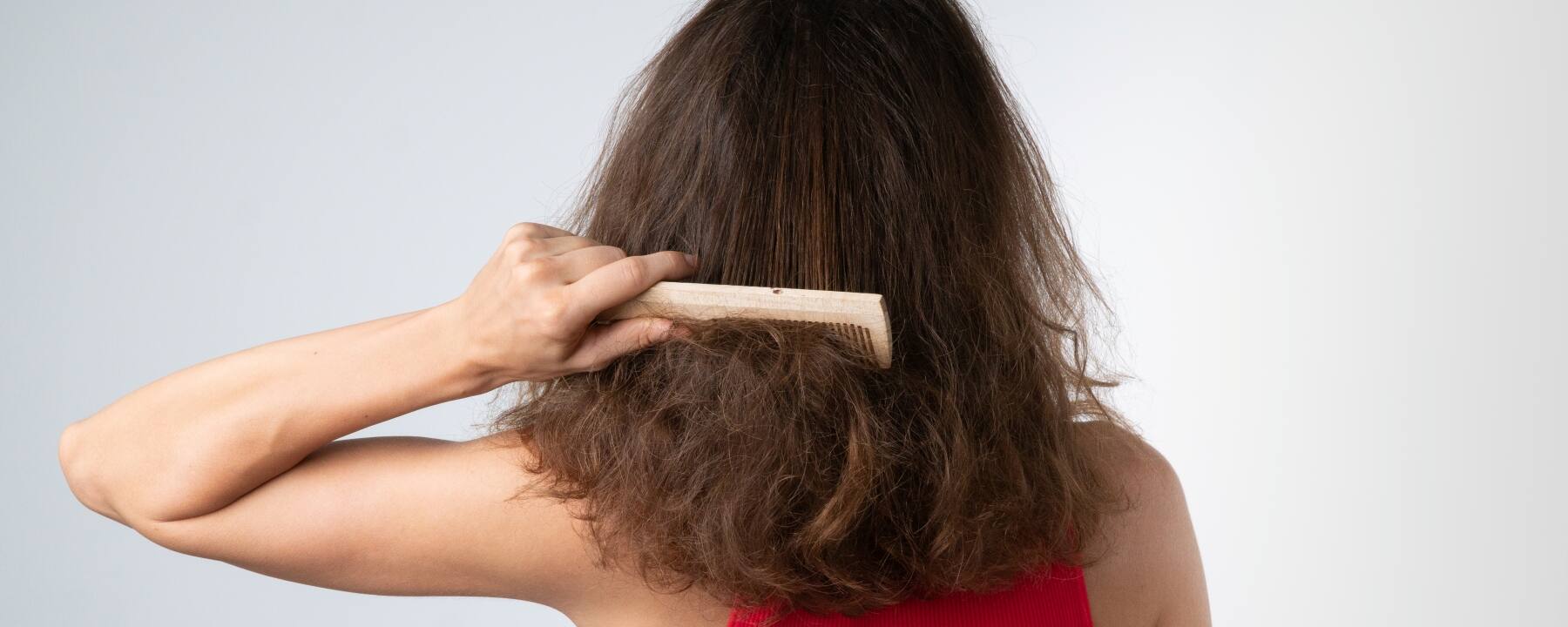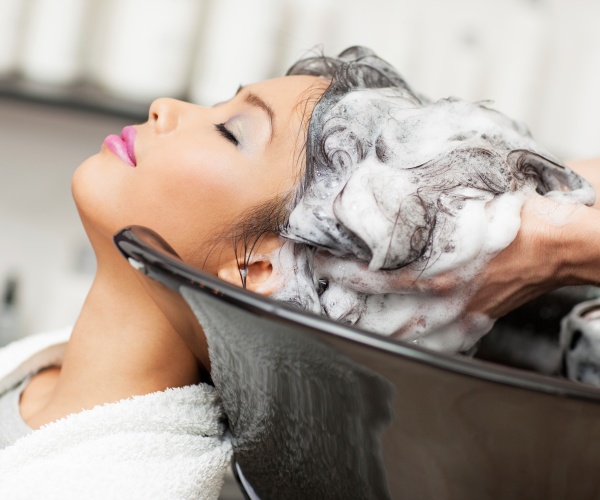
Hair Care & Co.
No Poo – better without
Many trends in the cosmetics industry are helped along by companies and manufacturers carrying out intensive research, then constantly improving their products. The "clean beauty" movement also benefits from this approach. When it comes to the "no shampoo" trend, though, it doesn't work. The whole idea is to do without shampoo altogether.
For any type of skincare or haircare, there is no single product that suits everyone. There is no such thing as “one size fits all”. It's just not possible. People differ far too much in all their needs, living conditions and hereditary factors.
Environmental awareness is another point that needs to be taken into consideration, which places skin problems and other health risks under sharper scrutiny. For some consumers, cosmetics should just consist of a few ingredients that are as natural as possible. For this very reason, developments in the cosmetics industry over the past few years have shown that the products with the latest formulations, new ingredients and active substances are customizable and adaptable. If you look, you will find the right product for your care program and personality type.
However, the personalization of products is of no interest to the supporters of the “No shampoo/water only” movement. They consider classic shampoos to be not just problematic, but downright harmful. That’s why they don't use any shampoo at all, relying instead solely on water and such ingredients as rye flour, baking powder, lemon juice, eggs and even beer. Regular brushing is also necessary to ensure the body’s own sebum is well distributed in the hair. It is also important to massage the scalp. It's all about Mother Nature. Using care products such as shampoo is really vilified.
The initial period seems hard and takes some getting used to
Click around on the Internet a little and you will find that most people have similar experiences when they give up shampoo. The first few weeks are tough, it takes some getting used to, and can even be vile. Later on, though, they claim the hair recovers and the scalp's sebum production returns to normal. When reading this, many people turn their noses up just thinking about the odors that might be involved. The advocates of this trend claim that after a while their hair looks much healthier and shinier than it did when using shampoo to clean and care for their hair.
Shampoo
Cleans hair, removes dirt, grease and any dandruff. There are special shampoos for different hair types, such as dandruff shampoo and shampoo for dry hair.
Not everyone is on board with giving up shampoo. People with a normal, healthy scalp may well be able to handle it. But: those with scalp problems, such as an itchy, oily, dry and sensitive or flaky scalp, can encounter problems, even malfunctions. For example, an imbalance in moisture, the way sebum changes on contact with the air and/or the metabolites of sebum produced by the microorganisms on the scalp can lead to itching and/or a dry or irritated scalp.
In a study conducted by scientists involving a research team in Antarctica and astronauts on the International Space Station – neither of whom could wash their hair – they found that the microbial levels on the scalp increased 2–3 fold. This increase in the concentration of malassezia led to much more itching and dandruff formation.
Dermatological studies have also found that using shampoo clearly improves some scalp conditions. More information: "The Impact of Shampoo Wash Frequency on Scalp and Hair Conditions" .
Malassezia
Malassezia are species of yeast fungus found in the skin flora of every human being. Although many people associate fungi and yeasts on the skin with diseases, the presence of malassezia does not necessarily have to be bad or uncomfortable.
pH value of the scalp must be observed
You might think that a flaky scalp is the result of a scalp that is far too dry. In fact, while unpleasant dandruff and itching can occur on a dry scalp, it can also affect and cause problems on an oily scalp. Water alone cannot help clear this issue. The skin and hair need help. In any case, careful skin and hair care with suitable products is important. If problems such as dandruff, redness or itching cannot be resolved with regular care routines, we recommend that you consult a dermatologist.
What's more, many people are not aware that the benefits of “No shampoo” are not actually scientifically proven. However, that doesn't necessarily mean it can't work. But: Some of the methods used can be harmful. For example, if baking powder and apple vinegar are used for “hair care” but are not sufficiently diluted, this can have an adverse affect on the natural pH of the scalp. It will irritate the scalp and cause negative changes to hair structure.
However, as we repeatedly emphasize in many of our articles, not everyone is not the same, and everyone has their own personal wishes and needs. Everyone has to decide for themselves what works for them and what they like best.
Exceptions confirm the rule
Of course, we recommend using shampoo and related products for appropriate care, but using more shampoo does not necessarily mean better results when washing your hair. Watch how much you use. For medium-length hair, an amount the size of a golf ball or walnut is sufficient. Likewise, washing multiple times may not be necessary. Exceptions may prove the rule here, of course: if your hair is extremely dirty or has been treated with a lot of styling product, it will be grateful for a rinse and repeat. Shampoo ingredients also differ, and you may tolerate one shampoo better than another. Trying new products out now and then is useful.
All our reports on the Internet have still left a few questions unanswered, so we asked our colleague Dr. Annette Mehling – Senior Manager, Skin Sciences, a BTS and Eurotox-registered toxicologist at BASF – to give us the answers.
Annette, we often read that regular shampooing affects the production of sebum on the scalp. Others claim that sebum production depends only on the individual. Which is correct?
Annette: There is no easy answer to that. Many factors play a role in the production of sebum on the scalp. Most people are probably aware that when an individual reaches puberty, their sebum production increases due to hormonal changes. There are also studies showing that ethnicity and gender play a role. There have not been enough controlled studies conducted over a long period of time to be able to provide a certain answer.
We’ve often said no one needs to be “afraid” of the ingredients found in cosmetic products. Can you give us a short, snappy statement in favor of using shampoos?
Annette: We all have certain wishes and needs when it comes to our hair. Shampoos are developed and formulated with these requirements in mind. They allow us to care for our hair and keep it looking healthy. Personally, I find one thing especially important to mention in this context: in the EU, a safety assessment is carried out for all cosmetic products, including shampoos. The use of various ingredients, such as preservatives, is heavily regulated and some substances are prohibited (1,328 substances were prohibited as of the end of 2022). In other words, you really don't have to worry about safety.
Not washing for weeks sounds messy and gross. What exactly happens to the hair and scalp if you don't take care of it?
Annette: Again, it is very difficult to give a clear answer. It depends, for example, on what ends up on our scalps, what environmental influences we are exposed to, and whether any medical conditions may be present. Hormonal status also plays a role. Sebum ingredients may be broken down by microorganisms, for example, especially if too much sebum is produced. This may create free fatty acids that can irritate the scalp. When we are exposed to heavy pollution, the pollutants can also affect the health of our scalps. When it’s hot and you sweat a lot, the healthy pH of the scalp can change. Some people bleach or dye their hair, which can also affect the scalp and irritate it. Cleaning and/or care makes sense here. Some people have long hair, others short and others none at all, and some have very fine hair. All of these factors can lead to different reactions to care products, for example, if shampoos are difficult to rinse out residues may remain on the scalp. This can cause irritation, or may also be nourishing. However, I am sure you can imagine situations in which you can do without shampoo, and water alone is sufficient.
Should people with greasy hair wash their hair more often or less often?
Annette: It is not enough simply to look at the greasy hair to decide what to do. It also depends on what causes it, and your living conditions. It’s probably better to wash your hair more often. This doesn't mean several times a day. Several times a week is likely to be enough. There are studies that show once daily leads to more beautiful hair and the people taking part in the tests said their scalps felt better. Always bear in mind that nothing much will change straight away. Change – whether an improvement or a deterioration – tends to be a gradual process.
Thank you, Annette, for taking the time to answer these questions, so that we can cross them off our list.
Things are not always black or white. Everyone has their own, unique skincare and haircare needs. Find the right self-care program for you. One thing’s for sure: care is important and necessary. And just as individual as we all are.

